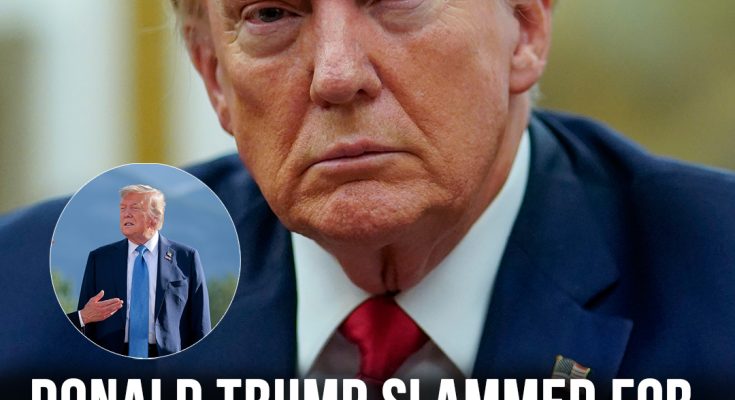
Donald Trump Sparks Global Firestorm After Abrupt G7 Exit and Escalatory Rhetoric Toward Iran
Former U.S. President Donald Trump is under intense global scrutiny after he abruptly left the G7 summit in Canada a full day ahead of schedule, offering a cryptic and controversial explanation for his departure that critics have described as “psychopathic,” “unhinged,” and “deeply dangerous.” The backlash spans diplomatic, political, and public arenas, with many condemning his erratic behavior at a moment of intensifying conflict in the Middle East.
The G7—comprised of leaders from the United States, United Kingdom, Canada, France, Germany, Italy, and Japan—has served for over 50 years as a premier platform for democratic nations to coordinate responses to global economic and security challenges. The 2025 summit, hosted this year by Canadian Prime Minister Mark Carney in Québec, was expected to prioritize economic stability, climate change, and growing tensions in the Middle East—particularly the escalating conflict between Israel and Iran.
But Trump’s sudden departure on Monday, June 16, just hours after a private dinner with other world leaders, derailed the summit’s momentum and drew widespread condemnation.
A Vague and Alarming Justification
White House Press Secretary Karoline Leavitt attempted to downplay the decision, stating on social media, “Much was accomplished, but because of what’s going on in the Middle East, President Trump will be leaving tonight after dinner.” No further details were provided.
Trump himself later told reporters that he had informed Prime Minister Carney of his decision and believed the other leaders would “understand,” adding, “I wish I could stay until tomorrow, but they understand. This is big stuff.”
While the official narrative attempted to frame his departure as urgent and necessary, it left many unconvinced. Trump had just signed the G7’s final joint statement, which included a strongly worded call for an immediate ceasefire in Gaza and a broader de-escalation between Israel and Iran. But mere hours later, he posted a dramatically different message on Truth Social—one that appeared to contradict the summit’s unified position.
In his post, Trump warned residents of Tehran to evacuate immediately, referencing Israel’s continued military strikes on Iran’s nuclear and military infrastructure. “Everyone should immediately evacuate Tehran,” he wrote, in a message that many experts saw as incendiary and reckless, particularly given the volatile state of the region.
Clashing With Macron and Allies
Tensions further escalated after French President Emmanuel Macron suggested that Trump’s early exit may have been tied to backchannel ceasefire talks. In response, Trump launched into a tirade on Truth Social.
“Publicity-seeking President Emmanuel Macron, of France, mistakenly said that I left the G7 Summit, in Canada, to go back to D.C. to work on a ‘cease fire’ between Israel and Iran. Wrong!” Trump wrote. “He has no idea why I am now on my way to Washington, but it certainly has nothing to do with a Cease Fire. Much bigger than that. Whether purposely or not, Emmanuel always gets it wrong. Stay Tuned!”
The post was met with an avalanche of criticism across political and diplomatic circles. Observers noted that such inflammatory language toward a close ally during a moment of international crisis was both irresponsible and counterproductive.
“It’s the same old Trump—isolating our allies, inflaming tensions, and undermining diplomacy,” wrote one former U.S. diplomat on X. “We need cooperation, not chaos.”
Others recalled Trump’s past attempts to bring Russia back into the G7—formerly the G8 until Russia’s 2014 expulsion over the annexation of Crimea—and said the latest episode reinforced his disregard for Western unity.
Heightening Regional Tensions
Analysts were quick to point out that Trump’s dramatic rhetoric could have dangerous consequences, especially in a region already teetering on the edge of war. On June 12, Israeli forces launched strikes on suspected Iranian military and nuclear sites in response to alleged provocations by the Islamic Revolutionary Guard Corps (IRGC). While the U.S. government has publicly claimed no direct involvement, many believe American intelligence and logistical support are being quietly provided behind the scenes.
Trump’s vague references to a “deal” only deepened the mystery. Before leaving the summit, he had hinted to reporters: “Iran wants to make a deal. And as soon as I leave here, we’re going to be doing something. But I have to leave here.”
Yet by Tuesday morning, no diplomatic breakthrough had been announced. Instead, Trump doubled down on confrontational rhetoric. “Iran should have signed the ‘deal’ I told them to sign. What a shame, and waste of human life,” he posted. “Simply stated, IRAN CAN NOT HAVE A NUCLEAR WEAPON. I said it over and over again! Everyone should immediately evacuate Tehran!”
The statement sparked widespread alarm. Security experts warned that such public ultimatums—especially ones implying imminent military action—could cause unnecessary panic, incite retaliatory strikes, or derail any existing backchannel negotiations between the U.S. and Iran.
“This is not how diplomacy works,” said an intelligence analyst from the Brookings Institution. “Issuing public evacuation warnings for a foreign capital without any official action or intelligence to back it up is wildly irresponsible and only serves to raise the risk of conflict.”

Echoes of Past Behavior
This is not the first time Trump’s behavior on the world stage has drawn criticism. During his presidency, he famously walked out of multiple international summits, refused to sign communiqués, insulted allies, and often sided with adversaries such as Vladimir Putin. His public admiration for authoritarian leaders and antagonism toward democratic allies repeatedly strained U.S. foreign relations.
Still, many hoped that Trump’s presence at this year’s G7 would mark a shift toward more conventional diplomacy, particularly as global tensions rise. Instead, his early departure and inflammatory comments have left world leaders scrambling to reassure their citizens and maintain diplomatic coherence.
Unanswered Questions and Global Repercussions
As of now, it remains unclear what the “deal” Trump referred to actually entails, or whether any substantive negotiation with Iran took place. The Biden administration, while attempting to distance itself from Trump’s statements, has remained largely silent on the matter, fueling speculation that secret diplomatic or military efforts may be underway.
Meanwhile, Iran has not officially responded to Trump’s posts, but local media has reported increased military readiness in major cities, and satellite imagery shows elevated activity around known nuclear and defense facilities.
“The world is watching very closely,” said a senior NATO official. “This kind of unpredictable messaging can have real-world consequences. It’s not a game.”
As the international community struggles to prevent a wider regional conflict, Trump’s role remains controversial—and potentially destabilizing. Whether his dramatic exit from the G7 and subsequent online proclamations were based on legitimate intelligence or mere political theatrics remains to be seen. What is clear, however, is that the former president continues to shape global discourse—often with dangerous implications.



